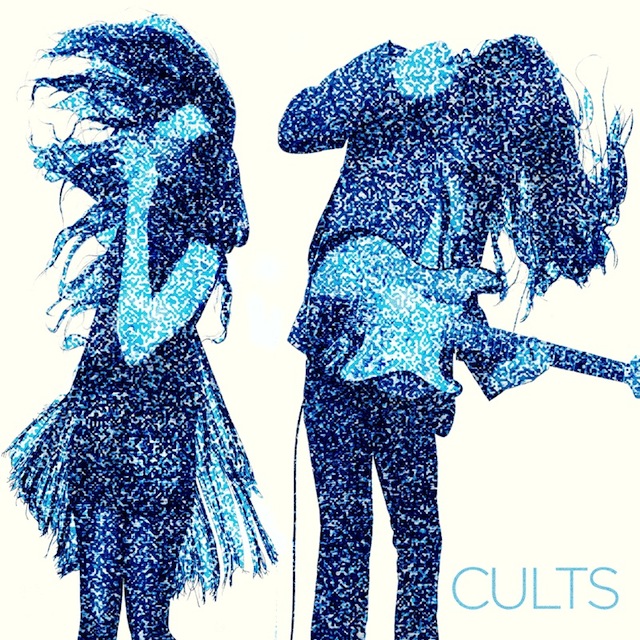Following the release of their much-loved eponymous debut, Cults’ vocalist Madeline Follin and multi-instrumentalist Brian Oblivion broke up, ending a four year relationship. Fortunately, they were grateful for their fans, and all of the accolades they had received from critics, and so they decided to continue making music together.
Much like listening to The Civil Wars’ new album — another sophomore record by a couple that split up post debut — it’s impossible not to try to read between the lines and figure out which songs are actually about their failed relationship when listening to Cults’ new album, Static. The product description on Amazon is interesting, then: “Static is a breakup album. Just not in the way we think of a breakup album. That cold knot in your stomach when you lose someone? That is not longing for a person. That is dread, uncertainty of what comes next.”
If Follin and Oblivion feared what would come next for them musically, you’d never know it from listening to Static’s lush tracks, which take their Motown and ’60’s girl-group influences and run with them at full speed — and with no noticeable hesitation — perfectly colliding with the world of contemporary noise pop in the vein of The Raveonettes. Like their debut, they co-produced Static along with former Vampire Weekend engineer Shane Stoneback, but this time they were aided by Ben Allen, who has produced records for Gnarls Barkley, Washed Out, Animal Collective, Deerhunter, and Youth Lagoon, among others.
From the first time one listens to Static, it’s obvious that the album shows new depth, that they’ve added extra layers of sound to their songs. For proof of that, just listen to the album’s gorgeous intro track, “I Know,” which blends reverb-washed guitars, faint and ghostly vocals, old school synthesizers, a bit of white noise and various unidentifiable sounds, resulting in a concoction that would make a perfect theme song for a reboot of The Twilight Zone.
“I Know” ends with, surprise, surprise, the sound of static, which blends right into the next song, the album’s contagious first single “I Can Hardly Make You Mine.” Of all the songs on the album, it’s the one most in the pop vein and the one where their ’60’s influences show the most. Live percussion and slightly crunchy guitars guide the track, which is also embellished with sharp piano, groovy bass guitar and all sorts of background sounds that call to mind sound effects from old television shows like Batman. “Boy, just bring all your love back to me / I guess for now this is how it’ll be,” Follin sings with sheer desperation in her voice. One has to wonder if it isn’t a sign that she’d like to be romantically involved with Oblivion again. Either way, it’s one hell of a gorgeous break up song. It’s also the album’s strongest song, as none of the tracks that follow are as immediately catchy. It’s not an inaccessible album, however, and it proves to be quite the grower with repeated listens.
My favorite song on the album is “High Road,” which finds Follin’s vocals sugary sweet with a huge wall of sound behind them, including reverb-drenched percussion, a funky bass guitar line, staticy guitars, jittery piano, swirly synthesizers and echoey white noise. “Should’ve taken the high road / Now it’s such a long way back,” Follin sings during the bittersweet chorus. “Instead I take the long road / Figured I would simply be getting back.” It sounds candied but there’s also an air of regret about it.
Follin sings beautifully over theremin that sounds straight out of a ’50’s sci-fi movie during “TV Dream,” a lovely little song just barely over a minute long that would also be a perfect television show theme song, which is probably the point. The band reportedly surrounded themselves with broken televisions in the studio while making Static and these otherwise useless TVs likely served as the inspiration for this one.
Another highlight is the bizarre “We’ve Got It,” which adds organ and folk-ish banjo to the mix, resulting in a sound that recalls early ’70’s pop while also sounding rather futuristic. “We’ve got it, we’ve got it / And he won’t be a problem anymore,” Follin sings cheerfully. On this one, she sounds as though she’s found and embraced new love.
I’m also quite fond of the album’s closing track, “No Hope,” which also has its share of sci-fi sounds along with a highly potent rhythm, which finds the bass guitar and drums chugging along with vigor, and delicate piano that you might not even notice the first time you listen to the song. Most of the other songs contain elements that you might not notice the first time you play the album either, making the music swell up with a sense of mystery that matches the curious lyrics perfectly.


Leave a Reply